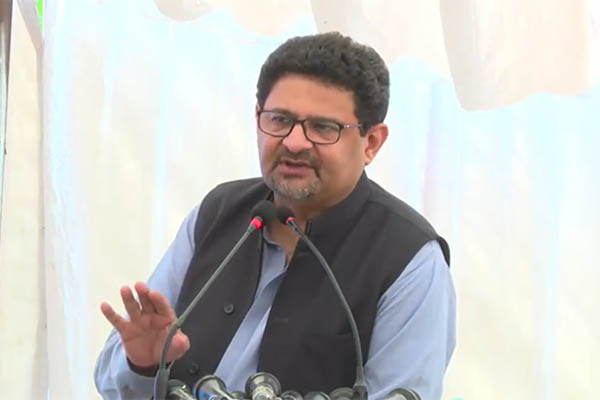
File photo of Finance Minister Miftah Ismail
Finance Minister Miftah Ismail on Friday used his “winding up” speech for the federal budget of the upcoming fiscal year to withdraw several relief measures that had been announced earlier this month, including raising the tax rates for salaried individuals.
Rationalization of the tax rate for various salaried slabs was a key demand of the International Monetary Fund (IMF), which has yet to formally revive a suspended $6 billion bailout program seen as essential for Pakistan to achieve macroeconomic stability and avoid default. Last week, the IMF resident representative in Islamabad had issued a statement maintaining that “additional measures” would be needed to bring the federal budget in line with key objectives of the IMF program.
In his speech to the National Assembly on Friday, Ismail said the government was increasing the tax collection target of the Federal Board of Revenue (FBR) from Rs. 7,004 billion to Rs. 7,470 billion, a hike of Rs. 466 billion. To achieve this, the government has imposed a 10% ‘super tax’ on 13 high-earning sectors of the economy, with an aim at generating Rs. 80 billion in additional revenue. “The super tax of 4% will be applicable to all sectors,” Ismail said in a posting on Twitter. “But for the specified 13 sectors, another 6% will be added for a total of 10%. So their tax rates will go from 29% to 39%. This is a one-time tax needed to curtail the previous four record budget deficits,” he added.
The 13 sectors being targeted for the 10% tax hike are cement, sugar, steel, oil and gas, LNG terminals, textiles, banking, automobile industry, tobacco, fertilizer, aviation, chemicals and beverages. High-income individuals have also been subjected to a “poverty alleviation tax,” with annual income over Rs. 150 million being taxed at 1 percent; Rs. 200 million at 2 percent; Rs. 250 million at 3 percent; and Rs. 300 million at 4 percent.
Additionally, the government has decided to impose greater tax on salaried individuals, with the finance minister announced that people earning between Rs. 50,000 and Rs. 100,000 per month would now be charged income tax of 2.5% against the fixed rate of Rs. 100 that had been announced in the budget speech earlier this month. For earners of Rs. 100,000-300,000/month, the proposed tax rate has been jacked up to 12.5%.
Individuals earning between Rs. 2.4 million and 3.6 million/year would be charged a fixed rate of Rs. 165,000 in addition to 20 percent of the amount exceeding 2.4 million, while people whose taxable income exceeds Rs. 3.6 million but is below Rs. 6 million would be charged a fixed rate of Rs. 405,000 plus 25 percent of the amount exceeding 3.6 million.
Similarly, individuals with an annual income between Rs. 6 million and Rs. 12 million would be charged Rs. 1.005 million plus 32.5 percent of the amount exceeding 6 million, and anyone earning more than Rs. 12 million—a “few thousand” people, according to Ismail—would be charged taxes of Rs. 2.955 million plus 35% of the amount exceeding 12 million.
According to the finance minister, the government also plans to impose a maximum petroleum levy of Rs. 50/liter on all petroleum products, as well as Rs. 30,000/ton on LPG. He told local media that if the global fuel prices dropped, it would allow the government to retain the current prices of the commodity, adding that there were no plans to pass on the benefit of any reduction to the consumer in the near future.
The government has also proposed a fixed tax of Rs. 40,000 for all jewelry shops, while cutting withholding tax on the sale of gold by consumers from 4 percent to 1 percent. Ismail said authorities wanted to bring in more retailers into the tax net and had decided to introduce a new fixed tax of Rs. 3,000/month for small retailers and Rs. 10,000/month for big retailers. He said the government had also withdrawn withholding tax on I.T. companies with sales of less than 80 million, adding that tax on venture capital funds invested in the I.T. sector had also been removed.
